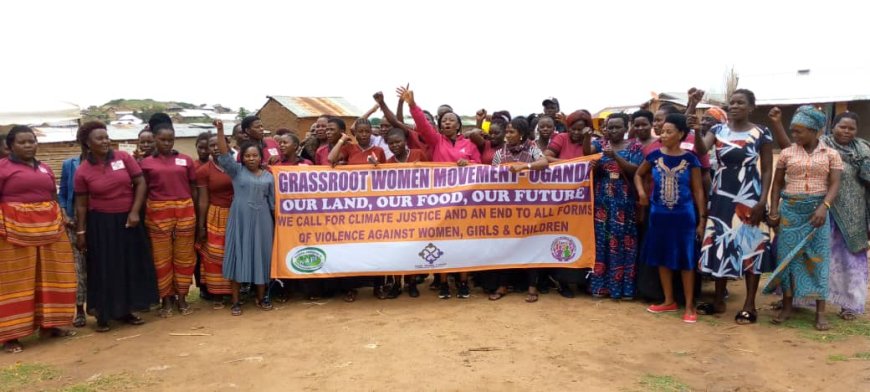Grassroots Women Decry Increased Food Insecurity and Gender-Based Violence, Calling to End Oil Drilling in Their Areas

By our reporter
Grassroots women have decried the increased food insecurity and gender-based violence that have been escalated by the ongoing oil and gas operations pointing mainly to the East African Crude Oil Pipeline (EACOP) and other related feeder oil pipelines.
During their recent interaction meetings at the close of August 2024, EACOP-affected women under the Grassroots Women Movement led by the National Association of Professional Environmentalists (NAPE) expressed dismay over continued compulsory takeover, evictions, and land grabbing have sparked food insecurity with lost livelihoods and reducing farmlands and also increased gender-based violence due to poverty and unfair compensation.
“Our land, which has sustained us for long by growing food for consumption and selling for income is now hosting oil fields, new roads and pipelines. We are suffering from accelerated food insecurity, climate change effects and ecosystem depletion,” said Joyce Kadogoli, a resident of Kakindo village in Buliisa town council.
They say the communities are feeling the pinch of the negative impacts of extractives including increased cases of violence against women, girls and children, gender-based violence, food insecurity, and violation of human rights due to the massive infrastructure development for oil and gas.
“Now that women have lost their livelihoods, we are suffering from poverty which has forced many women into prostitution for survival leading to family breakups, increased school drop-outs, early marriages and child-headed families,” said Anna Basiima, a resident of Kigaaga in Hoima district.
However, the women say their efforts to bring the issues to the limelight have been received with threats and intimidation from the government.
Beatrice Rukanyanga, the coordinator for Kwataniza Women’s Group in Hoima says they have continuously been stifled by the government for defending the rights of people affected by crude oil activities.
She commended Community Green Radio for amplifying their voices and giving them a platform to speak up and collectively resist the negative impacts of oil and gas extractives.
“My group was among the 54 organizations that were suspended by the government for 4 months. But even in suspension, I was using community Green Radio to talk about issues affecting women. Community Green Radio has been helpful in putting our voices on the airwaves so that we can talk about the issues affecting us,” said Rukanyanga thanking partners such as the 11th Hour Project who are supporting the Green Radio Outreach Advocacy Work.
The women called on Community Green Radio journalists to make more frequent visits and coverage of oil and gas injustices amidst economic hardships noting that their remote and hard to reach locations quite often put them at a disadvantage making them suffer in silence against negative impacts of the many oil and gas infrastructure hosted in their localities singling out Oil well pads, oil pipelines, central processing facilities and oil roads.
Rajab Bwengye, the coordinator of projects at NAPE said the Green radio’s aim is to strengthen the voices of grass root women and youths, give them an advocacy platform and shape interventions on issues affecting them. He pledged for continued coverage of their issues and putting their voices on the airwaves.
“Women are the experts of their own lives. They know better the issues affecting them than anybody else and that’s why as Community Green Radio, we have created safe spaces for them to be heard and be part of the conversation on oil and gas injustices,” said Bwengye.












